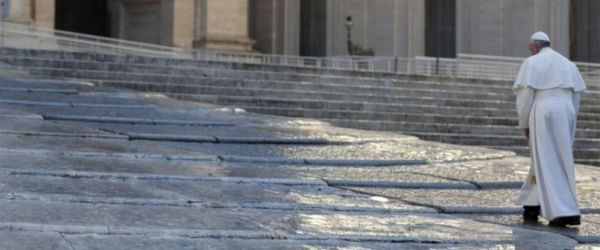Jn 6:1-15 recounts the parable of the multiplication of the loaves and the fish. Seeing that a large crowd had followed him to Lake Tiberias, Jesus turned to the Apostle Philip and asked him: “How are we to buy bread, so that these people may eat?” (v. 5). The few denarii that Jesus and the apostles had were in fact not enough to feed that multitude. And then came Andrew, another of the Twelve, leading a young lad to Jesus, who made all that he had available to them: five loaves and two fish. But certainly, Andrew says, this is not enough for that crowd (cf. v. 9). He was a good lad! Courageous. He too could see the crowd and the five loaves but he says: “I have this: If you need it, take it”. This boy makes us think.... What courage.... Young people are like this. They have courage. We must help them express this courage. And yet, Jesus ordered his disciples to ask the people to sit down. He then took the bread and the fish, gave thanks to the Father and distributed it (cf. v. 11) and everyone was able eat their fill. Everyone ate as much as they wanted.
With this Gospel passage, the liturgy inspires us to keep our gaze on Jesus, who, in last Sunday’s Gospel passage according to Mark, upon seeing “a great throng ... had compassion on them” (Mk 6:34). That boy too with the five loaves had understood this compassion and said: “Poor people! I have this...”. His compassion moved him to offer what he had. Indeed today, John shows us again that Jesus is attentive to people’s primary needs. The parable describes a concrete fact: the people were hungry and Jesus engaged his disciples so that this hunger could be satisfied. This is the concrete fact. Jesus did not only offer this to the crowd — he offered his Word, his solace, his salvation, ultimately his life —, but he certainly did this too: he took care of the food for the body. And we, his disciples, cannot ignore this. Only by listening to the peoples’ most simple requests and being close to their practical existential situation can one expect to be listened to when speaking about higher values.
God’s love for a humanity that is hungry for bread, freedom, justice, peace and, above all, his divine grace, never fails. Even today, Jesus continues to feed, to make his presence alive and comforting, and he does so through us. So the Gospel invites us to be available and hard working, like that youth who, realizing he had five loaves, says: “I contribute this, then you will see [to it] ...”. Faced with the cry of hunger — all types of “hunger” — of many brothers and sisters in every part of the world, we cannot be detached and calm spectators. The proclamation of Christ, Bread of eternal life, requires a generous commitment of solidarity toward the poor, the weak, the least ones, the defenceless. This action of closeness and charity is the best test of the quality of our faith, both at the personal level and at the community level.
Then at the end of the story, Jesus, when everyone had eaten their fill, Jesus told the disciples to gather up the leftovers so that nothing would be wasted. And I would like to suggest to you this sentence that Jesus uttered: “Gather the fragments left over, that nothing may be lost” (v. 12). I am thinking about the many hungry people and how much leftover food we throw away.... Let each of us think about this: where does the food that is left over from lunch go, from dinner, where does it go? What is done with the leftover food in my house? Is it thrown away? No. If you have this habit, I will give you some advice: speak to your grandparents who lived through the post war period and ask them what they did with the leftovers. Never throw away leftover food. Either heat it again or give it to someone who can eat it, to someone who needs it. Never throw away leftover food. This is a piece of advice and also an examination of conscience: what do we do with leftovers at home?
Let us pray to the Virgin Mary so that programmes dedicated to development, food and solidarity may prevail in the world and not those of hatred, weapons and war.
[Pope Francis, Angelus 29 July 2018]












